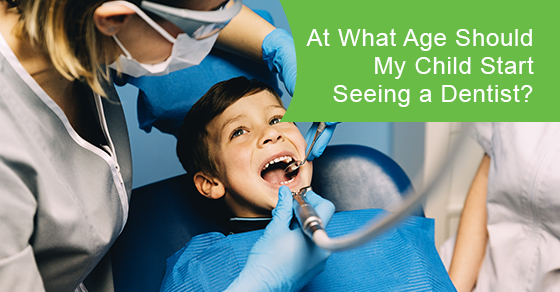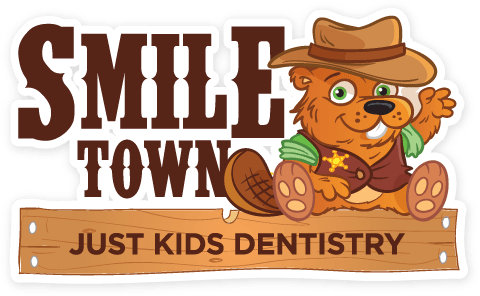At What Age Should My Child Start Seeing a Dentist?
- November 16th, 2022
- Childrens Dental Tips
- Jonathan Campbell

Many parents have varying opinions on when their child should first visit the dentist, or may not have a general idea at all if they are brand-new to parenting.
Luckily, however, the rule is rather simple to follow. As per the Canadian Dental Association’s recommendation, children should pay their first visit to the dentist before their first birthday, or within 6 months of the eruption of their first baby tooth.
Why do children need to visit the dentist so early on?
There are several reasons why children should have their first dental visit while they are still an infant, including the following:
Early exposure to the dental office will help to ensure their comfort: introducing your child to the dentist and dental office from a young age will help to familiarize them with the environment, including the unique sights, sounds and smells that we adults are now very much attuned to.
This early dental office exposure will play a fundamental role in shaping how your child feels about the dentist as they grow into adults.
When your child has positive, trusting (and fun) initial dental care experiences with our dentist limited to kids, they will be much less inclined to fear the dentist’s office or dental procedures in the future. We will always make sure your child’s dental visit is as pleasant as can be, and that’s a promise.
A dental exam will help to detect any issues before they become bigger problems:
The risk for tooth decay development begins with a child’s very first baby (primary) tooth. It’s important for a dentist to closely monitor your child’s mouth, as infants suffering from oral disease are not able to receive the standard in-office tooth sedation for their cavity treatment.
While it may come as a surprise, tartar can actually begin to develop in a child’s mouth at a very young age (immediately following the eruption of their first tooth). Our dentists at Smile Town are specially trained to identify early signs of decay in your child’s tooth or teeth and can provide the appropriate treatments in order to halt the oral disease from progressing.
The dentist will provide preventive treatments if necessary:
Our children’s only dentists believe in the importance of applying protective fluoride varnish to a child’s teeth, generally beginning when they are around 9 months old. Fluoride is a very effective mineral when it comes to strengthening the tooth enamel and protecting the teeth from decay and cavity formation.
Parents and kids will receive education regarding proper at-home oral care:
The dentist will ensure that you (the parent) are well informed about children’s oral care practices, cleaning techniques, dietary recommendations and tips that will help set your child’s smile up for a lifetime of success and good health.
There are also common oral care practices considered normal for adults, such as using more than a pea-sized amount of fluoridated toothpaste when brushing teeth, that are not advised for children under 7 or 8 as they may accidentally swallow the toothpaste.
Why should children have frequent dental check-ups?
In addition to having their first dental visit before the age of one, children should ideally be going for routine subsequent dental exams and cleanings at 6-month intervals. There are several reasons for this.
For one, you as a parent will be able to learn about whether the oral care practices you are implementing and having your child practice at home are working to keep your child’s smile healthy.
Secondly, you’ll be able to keep on top of problems such as tooth decay, enamel damage and gum disease before they require more extensive and costly treatment.
Thirdly, your child will be able to learn first-hand that visiting the dentist regularly plays an important role in preventing dental issues, while helping to keep their smiles clean, attractive and disease-free.
Things Parents Should Know About Their Child’s Dental Visit
There are several things parents should take note of in order to better prepare their child for their scheduled dental appointment, including the following:
-
Know that the dentist may want to take X-rays of your child’s teeth, which will help to visualize whether the teeth are developing the way they should, in addition to any signs of decay beginning to form in between teeth.
-
The dentist will also take a look inside your child’s mouth to examine the development and health of the teeth, assess the health of the gums, and check the overall bite.
-
The dentist will let you know if your child has crooked or crowded teeth that may potentially cause problems, although many bite irregularities will generally straighten out along with the growth and development of the jaw and mouth.
If your child does, however, have a bite that is deemed to be problematic in the near future, the dentist will recommend treatment approaches including potential orthodontic treatment. Mild to severe cases of malocclusion can successfully be treated with the use of orthodontic braces and/or retainers.
-
The dentist may have discussions with you about preventive treatments for your child, such as the aforementioned in-office fluoride application, or dental sealants to protect decay-susceptible teeth.
For parents who are not aware, dental sealants are essentially thin protective plastic coatings applied to molars that contain deep grooves known to easily trap food debris and bacteria. This is a very common practice for young patients, although adults with susceptible teeth may also benefit from this preventive treatment.
Reach Out to Our Dentist Limited to Kids Today
Is it finally time to book your child’s very first dental appointment?
Our children’s only dentist and team would be pleased to meet you and provide the most positive first (and second, and third, etc.) dental visit experience to your little one. We are always welcoming new patients with no referral necessary.
To book an appointment, call SmileTown – Just Kids Dentistry at (226) 773-1663, or contact us here.

